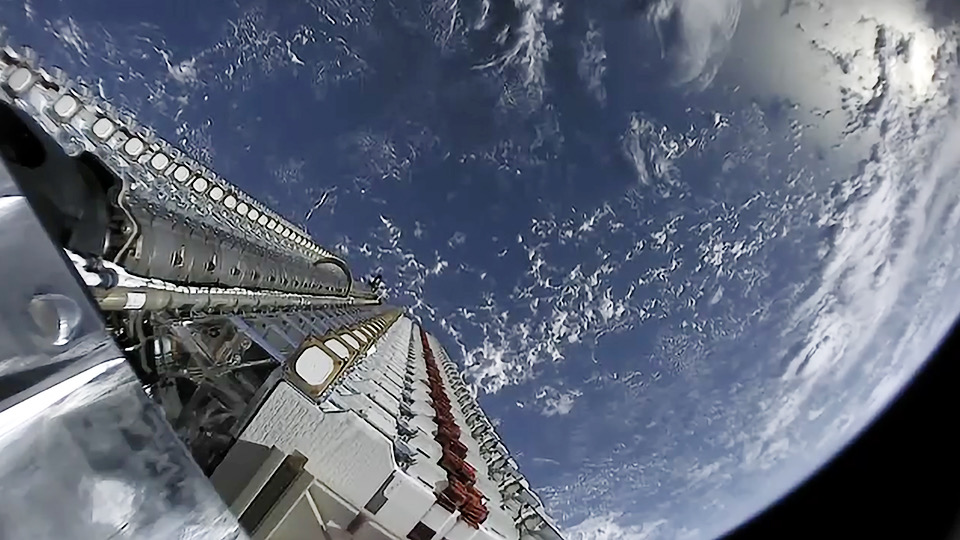SpaceX's Starlink Broadband Service Will Begin in 2020: Report
The U.S. Air Force is already testing it in military planes.

SpaceX, the private spaceflight company known for reusable rockets and a giant, shiny Starship, will begin offering its own satellite internet service in 2020, according to SpaceNews. In fact, the U.S. Air Force is already testing it in planes.
To build the service, SpaceX will have to launch up to eight Falcon 9 rockets filled with the company's Starlink satellites, SpaceX President and Chief Operating Officer Gwynne Shotwell told SpaceNews and other reporters this week at the 70th International Astronautical Congress in Washington.
"We'll continue to upgrade the network until mid to late next year," SpaceNews' Jeff Foust quoted Shotwell as saying during a media roundtable on Tuesday (Oct. 22). "We're hoping for 24 launches by the end of the year."
Video: Watch SpaceX Deploy 60 Starlink Satellites at Once
Related: SpaceX's 1st Starlink Megaconstellation Launch in Photos!
SpaceX launched the first Starlink mission, a Falcon 9 carrying 60 satellites, on May 23 to lay the foundation for a satellite constellation that will ultimately number in the tens of thousands. Another 60 are slated to launch next month.
This week, SpaceX CEO Elon Musk used the Starlink system to send a tweet for the first time.
"Whoa, it worked!" Musk wrote in the tweet on Tuesday. Musk used a Starlink terminal in his home to send the tweet. Eventually, Starlink customers will receive a box from SpaceX to access the network, SpaceNews reported.
"Knowing Elon, he wants everything to be beautiful. So the user terminal will be beautiful," Shotwell said Tuesday according to SpaceNews.
Get the Space.com Newsletter
Breaking space news, the latest updates on rocket launches, skywatching events and more!
Musk has said SpaceX will need at least 400 Starlink satellites in orbit for "minor" broadband coverage, and 800 satellites aloft for "moderate" coverage. The initial Starlink plan called for a megaconstellation of 12,000 satellites, and SpaceX recenty filed paperwork with the International Telecommunication Union (ITU) to launch another 30,000 satellites. The ITU is a United Nations agency that manages the global satellite radio-frequency spectrum, among other things.
Related: Space Companies Are Investing Big in 5G Technology
Ultimately, SpaceX may not need so many satellites in orbit for global coverage. But having them available will allow SpaceX to use some satellites for customized service, Shotwell said, according to SpaceNews.
One of those potential customers may be the U.S. military.
The U.S. Air Force is testing SpaceX's Starlink technology in military aircraft under a program called Global Lightning, Reuters and SpaceNews reported. The project, which is part of a $28 million contract SpaceX won from the Pentagon last year, is testing encrypted military communications via Starlink terminals in a C-12 military transport aircraft, Reuters reported.
"We are delivering high bandwidth into the cockpit of Air Force planes," Reuters' Joey Roulette quoted Shotwell as saying Tuesday.
SpaceX is not the only company pursuing satellite broadband services. The companies OneWeb, Telesat and Amazon have announced plans for megaconstellations of their own, but none as large as SpaceX's Starlink network.
- Elon Musk: Revolutionary Private Space Entrepreneur
- See the Evolution of SpaceX's Rockets in Pictures
- SpaceX: First Private Flights to Space Station
Email Tariq Malik at tmalik@space.com or follow him @tariqjmalik. Follow us @Spacedotcom and Facebook.
Join our Space Forums to keep talking space on the latest missions, night sky and more! And if you have a news tip, correction or comment, let us know at: community@space.com.

Tariq is the Editor-in-Chief of Space.com and joined the team in 2001, first as an intern and staff writer, and later as an editor. He covers human spaceflight, exploration and space science, as well as skywatching and entertainment. He became Space.com's Managing Editor in 2009 and Editor-in-Chief in 2019. Before joining Space.com, Tariq was a staff reporter for The Los Angeles Times covering education and city beats in La Habra, Fullerton and Huntington Beach. In October 2022, Tariq received the Harry Kolcum Award for excellence in space reporting from the National Space Club Florida Committee. He is also an Eagle Scout (yes, he has the Space Exploration merit badge) and went to Space Camp four times as a kid and a fifth time as an adult. He has journalism degrees from the University of Southern California and New York University. You can find Tariq at Space.com and as the co-host to the This Week In Space podcast with space historian Rod Pyle on the TWiT network. To see his latest project, you can follow Tariq on Twitter @tariqjmalik.









